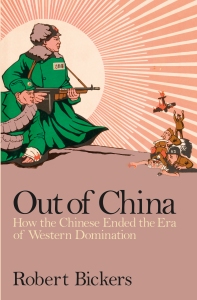 Shortlisted for the 2018 Wolfson History Prize, my most recent book, book Out of China, now published in a Penguin Books paperback in the UK, and in hardback in the US by Harvard University Press, narrates the struggle of China’s peoples across the twentieth century to roll back foreign power, and explores the explosive legacy today of the era of foreign domination. Starting in 1918 it charts the decline, fall and afterlife of the foreign enclaves that had been established in many of China’s great cities (as well as in some quite out-of-the-way backwaters). It shows how the battle to restore China’s dignity and sovereignty took place on battlefields, and in conference chambers, but also in museums and galleries, in Hollywood, in print, and on stage. Out of China is concerned with struggles over ideas, and political power, but I also draw out the human dimension, and the stories of those caught up by design or chance in this now largely vanished world. The battle for China was not over even when the last foreign colony, Macao, was handed back in 1999, and tensions over the record of foreign powers in China, and over the wider legacy and impact of the West remain live today.
Shortlisted for the 2018 Wolfson History Prize, my most recent book, book Out of China, now published in a Penguin Books paperback in the UK, and in hardback in the US by Harvard University Press, narrates the struggle of China’s peoples across the twentieth century to roll back foreign power, and explores the explosive legacy today of the era of foreign domination. Starting in 1918 it charts the decline, fall and afterlife of the foreign enclaves that had been established in many of China’s great cities (as well as in some quite out-of-the-way backwaters). It shows how the battle to restore China’s dignity and sovereignty took place on battlefields, and in conference chambers, but also in museums and galleries, in Hollywood, in print, and on stage. Out of China is concerned with struggles over ideas, and political power, but I also draw out the human dimension, and the stories of those caught up by design or chance in this now largely vanished world. The battle for China was not over even when the last foreign colony, Macao, was handed back in 1999, and tensions over the record of foreign powers in China, and over the wider legacy and impact of the West remain live today.
Media links: Out of China reviews
‘Barbarians Out’, review by Rana Mitter in New York Review of Books, 7 December 2017 (paywall).
Open Letters Monthly, review by Steve Donoghue, 11 September 2017.
Review by Peter Gordon, Asian Review of Books, 8 May 2017.
Interview in South China Morning Post, 3 May 2017.
‘Nationalism by another name’, review by Julian Gewirtz, in The Financial Times, 25/26 March 2017.
‘Power games’, review by Michael Sheridan in The Sunday Times, 26 March 2017 (paywall).
‘Boxed in Rebellion’, review by Gavin Jacobson, Times Literary Supplement, 19 April 2017.
Review in Prospect Magazine, by Julia Lovell, 11 April 2017

